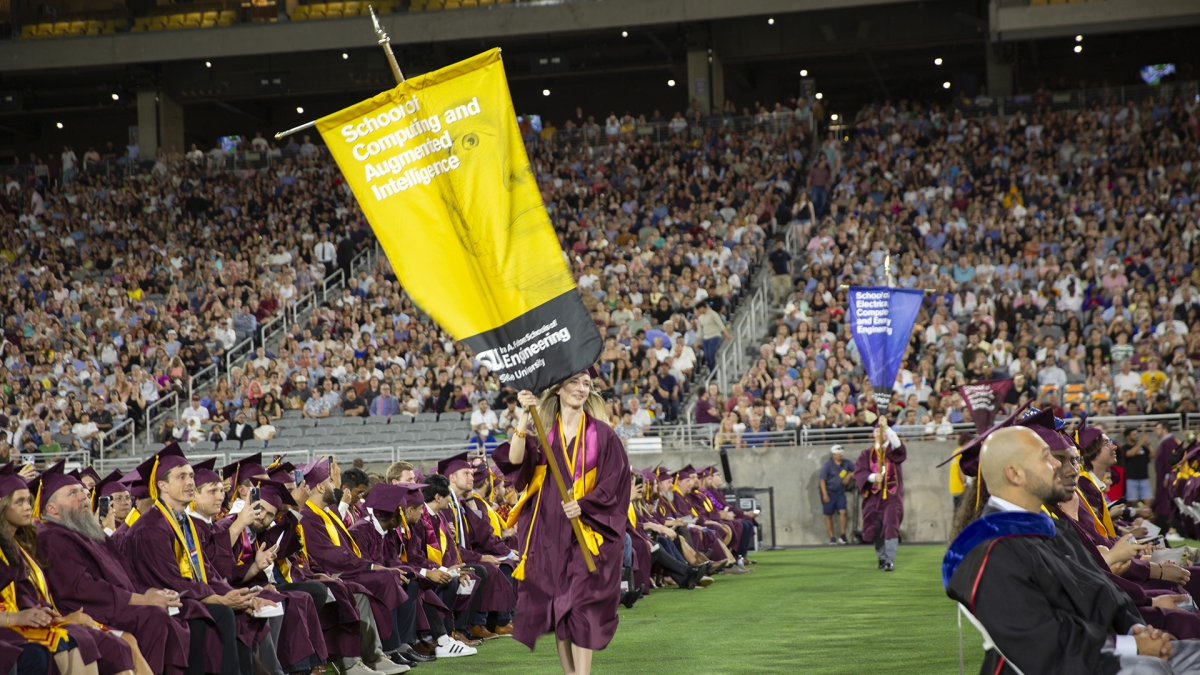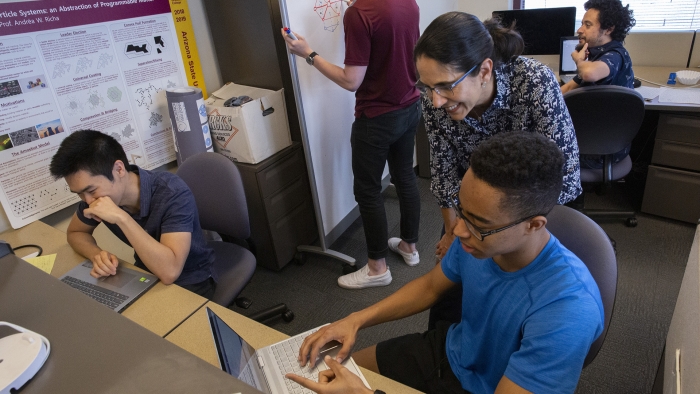Computer science school looks forward on heels of record-breaking graduation season

Emily Williamson carries the gonfalon for the School of Computing and Augmented Intelligence, part of the Ira A. Fulton Schools of Engineering at Arizona State University, at the start of the spring 2024 Fulton Schools Undergraduate Convocation ceremony. The computer science graduating class was the largest in the school’s history. Photo by Erika Gronek/ASU
This spring, at two packed convocation ceremonies, a crowd of newly minted engineers ebulliently cheered under a rain of fireworks, balloons and confetti as the School of Computing and Augmented Intelligence extended congratulations to 1,824 computer science graduates — one of the largest classes in the country.
It was also the largest computer science class in the history of the Ira A. Fulton Schools of Engineering at Arizona State University. As the students celebrated, they also prepared for their futures.
“This was a challenging degree, and there were many times I questioned if I could pull it all off,” says Emily Williamson, a 2024 graduate who received her degree in software engineering and recently started in her new role at GoDaddy. “But I have now secured a job at a company I used to dream about, and I see endless possibilities for the future.”
The class of historic size honors the commitment at ASU and the Fulton Schools to fill the engineering jobs pipeline. From fostering relationships with employers to growing its graduate program offerings and adding to its existing cadre of world-class faculty, here is a look forward at how the School of Computing and Augmented Intelligence plans to keep that momentum going.
Graduating greatness
Sending a record number of graduates into the workforce is both a point of pride and focus of concern for Ross Maciejewski, director of the School of Computing and Augmented Intelligence, who is keen to see students connect with good job opportunities.
“The vision of the New American University is all about broad access to quality education,” Maciejewski says. “But, of course, we hope that our students’ efforts here ultimately lead to work they find meaningful and fulfilling.”
ASU continues to rank highly among top U.S. institutions for employable graduates. For instance, ASU placed high on CodeSignal’s annual University Ranking Report, which ranks the top 50 national universities based on technical skills. The same report also urged employers to look harder at ASU students when searching for strong engineering talent, naming the university as one of the top five schools under-targeted by recruiters.
Toward that end, Maciejewski and his team convene regular meetings of an industry council — a group of advisors from companies such as Intel and Amazon — that provides feedback on how students can remain competitive in the jobs market.
Anthony Tam, business development director in the Fulton Schools, says the team is focused on building bridges with industry partners to ensure graduates have the necessary skills to access top job opportunities.
“We are developing relationships with both local and global employers,” Tam says. “While our goal is to foster lifelong learners, we also strive to equip students with industry-relevant experiences and ensure they feel confident in their skills.”
Growing graduate programs
Maciejewski also seeks to continue the school’s growth of graduate programs. In the spring, the School of Computing and Augmented Intelligence set a new record for most graduate students in Fulton Schools history.
According to the U.S. Bureau of Labor Statistics, demand for computer and information research scientists — positions that require a graduate degree — is growing at a 23% faster rate than all other occupations. The median annual wage for these positions is currently $145,080. It’s essential to fill that pipeline with qualified doctoral and master’s degree students.
The school is developing master’s degrees in artificial intelligence, with focus areas in industrial engineering and cybersecurity, that will help train students for challenging positions in those sectors.
A seminal and pioneering figure in distributed and parallel computing, Professor Stephen Yau believes that recruiting high-quality doctoral students is an essential part of maintaining excellence in computer science.
“Students from all over the world seek their doctoral degrees from strong programs like the ones here at ASU,” Yau says. “These students are the driving force in research and ensure that difficult, innovative work gets done.”
Plus, to help busy, working engineers advance in their careers, the school has launched a fully online Doctor of Engineering, or DEng, with a focus in engineering management. Designed to prepare engineers to lead large teams, the graduate degree can be completed in conjunction with the student’s work for their current employer.
Future faculty and forward momentum
To make sure students have access to the highest quality learning programs, this fall, the school will welcome 10 new tenure-track team members.
They will join a cohort of 131 globally recognized faculty members — a group that includes Regents Professor Huan Liu, ranked one of the world’s top 100 scientists by Research.com; biocomputing innovator Professor Stephanie Forrest; and famed mathematician Professor Dimitri Bertsekas.
Hailing from top academic programs from all over the country, the group of new assistant professors includes a past J.P. Morgan Fellow, a winner of the ENIAC Fellowship and an MIT Future Leader in Aerospace.
The new faculty members will also bring their diverse set of research interests to the school. One new industrial engineering team member has already been doing noted work to end food insecurity, studying agri-food flow networks — the supply chain that determines how food is produced, processed and distributed. The writing has been published in many top journals, including Nature Food.
Creating connections between the lab and the classroom
ASU is a comprehensive public research university that continues to rise in development spending.
Ensuring the School of Computing and Augmented Intelligence accelerates its inventive work is a key part of the mission for Maciejewski, who maintains his own high profile as a researcher. A leading expert in data visualization, he is consistently in the top 3% of ASU faculty members for grant awards by dollar amount. During his tenure, he has been recognized with $16.8 million in personal awards, has been a collaborator on more than $300 million in research proposals and has directly contributed nearly $14 million in research expenditures.
As director of the Center for Accelerating Operational Efficiency, or CAOE, a consortium of 25 universities and partners led by ASU, Maciejewski oversees a dynamic portfolio of data-driven projects that span public health, social media, transportation and supply chain management. CAOE is also a U.S. Department of Homeland Security Center of Excellence and was recently funded by the agency for its eighth year.
“There’s an important interplay between educational and research excellence,” Maciejewski says. “To be great teachers, our faculty members must be actively engaged in advancing knowledge. By pushing technological conversations forward, we can better prepare our students to be innovators.”
ASU President’s Professor Andréa Richa agrees. In 2024, she was named outstanding mentor for her role in the Fulton Undergraduate Research Initiative, a program that connects undergraduate students with faculty mentors, creating an important link between the classroom and the research lab.
“Our faculty members are very attuned to the need to inspire students and foster their growth in all stages of their learning,” Richa says. “We’re working to create research opportunities that integrate both undergraduate and graduate students. This has a very positive impact on the education of both groups because it adds a dynamic and diverse component to the collaboration.”
Welcoming the next generation of technological trailblazers
As the school prepares for the Class of 2025, longtime faculty members reflect on both the past and the future.
ASU Regents Professor Douglas Montgomery joined the Fulton Schools in 1987 and, as a thought leader in systems engineering, has shepherded students and colleagues through an ever-changing technological landscape. He is the recipient of multiple prestigious awards and a fellow of five engineering and statistical institutions.
“I am proud of all we have accomplished thus far,” Montgomery says. “But I believe the students of today are more determined than ever to use technology as a force for good. I am excited to see what develops, and I know Ross Maciejewski is the right choice to guide us to the next stage of our evolution.”
More Science and technology

Hack like you 'meme' it
What do pepperoni pizza, cat memes and an online dojo have in common?It turns out, these are all essential elements of a great cybersecurity hacking competition.And experts at Arizona State…

ASU professor breeds new tomato variety, the 'Desert Dew'
In an era defined by climate volatility and resource scarcity, researchers are developing crops that can survive — and thrive — under pressure.One such innovation is the newly released tomato variety…

Science meets play: ASU researcher makes developmental science hands-on for families
On a Friday morning at the Edna Vihel Arts Center in Tempe, toddlers dip paint brushes into bright colors, decorating paper fish. Nearby, children chase bubbles and move to music, while…



